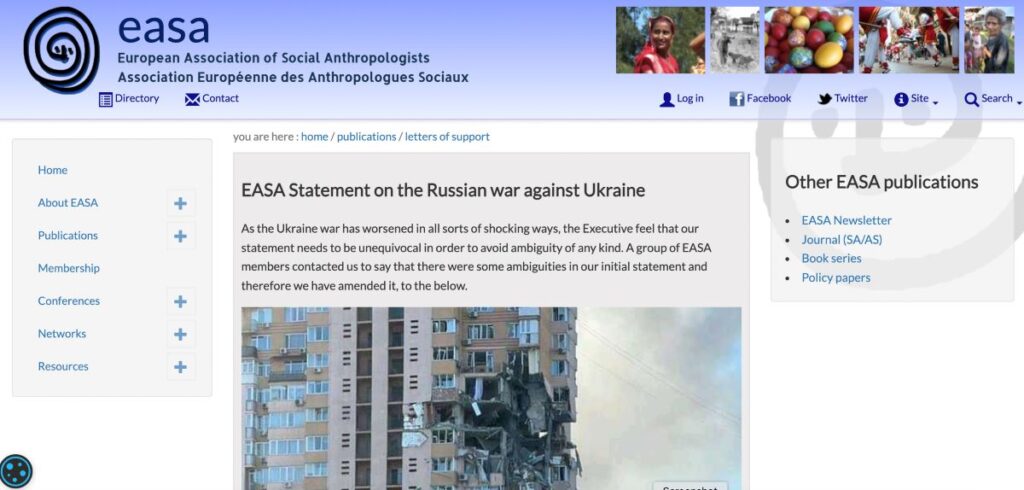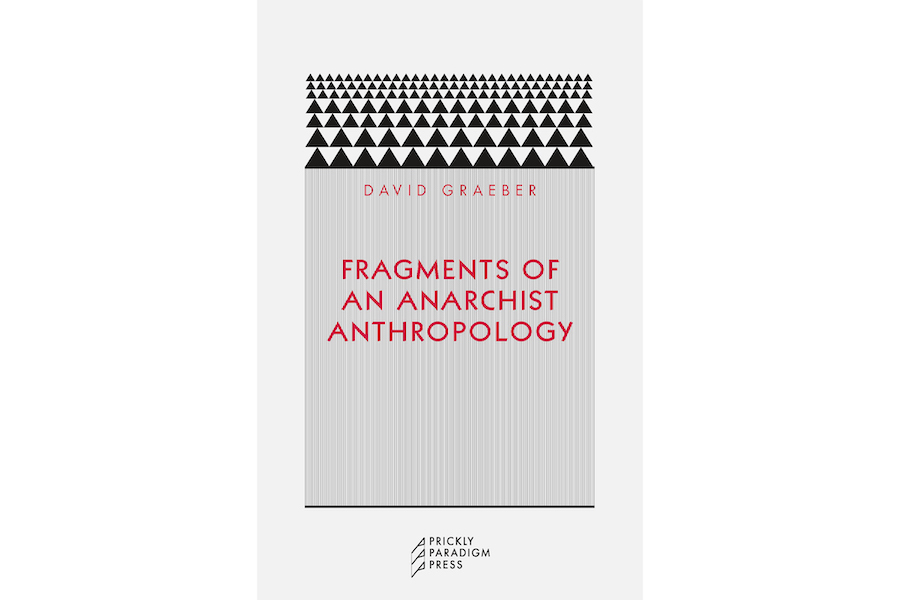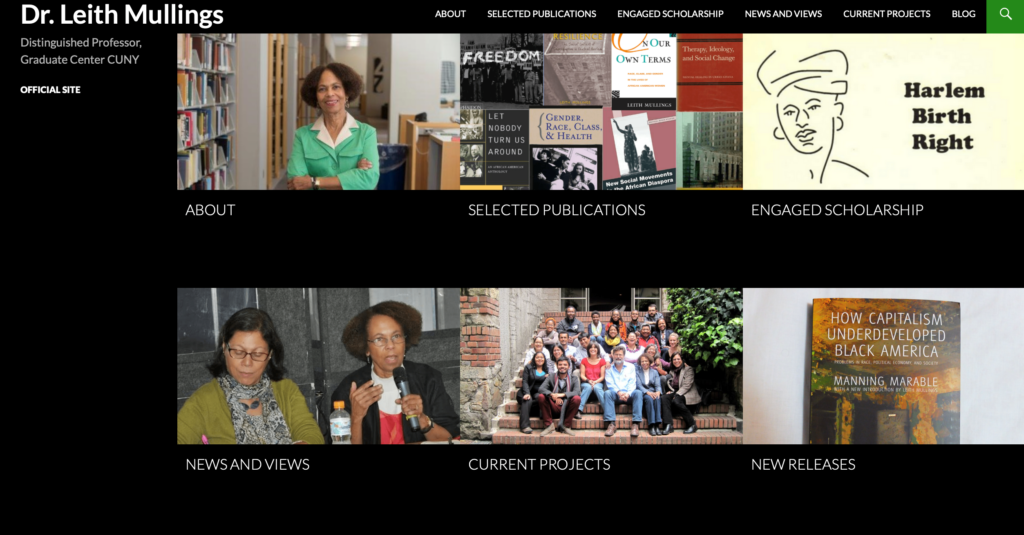One of the casualties of Putin’s war on Ukraine will be European critical social science. While the war has instigated important discussions about ‘US-plaining’, ‘Westplaining’ and about Russian imperialism, we also see—so far in a clash of keyboards—a growing weaponization of scholarship. There are signs of growing censorship of those ideas that would not align neatly into friend-enemy dyads. In the fight against ‘misinformation’, diverging opinions are framed, often preventively, as problematic and even pejoratively as “pro-Kremlin.”
It is with this in mind that I revisit herein the campaign to amend the “EASA Statement on the Russian war against Ukraine”, published initially on 26 February 2022 and amended on 15 March 2022. The case reveals how not only mainstream media and big tech are changing what is permissible, but how militarism, securitisation, and warmongering is creeping into anthropologists’ language and analyses, at times insidiously as they usurp anti-hegemonic and decolonial positions to enhance their credibility. Where it will take us is hard to predict, but it might be worth looking into the amendments of the EASA statement to cast light on possible futures in social anthropology’s debates and in order to make a case for anthropology as an anti-colonial, anti-imperialist, cosmopolitan and anti-war discipline.
EASA’s statement on the Russian war and the protest campaign to rewrite it
On the 26th of February 2022, two days after Russia’s invasion of Ukraine, the EASA executive committee (EASA EC) published a statement ‘EASA Statement on the Russian war against Ukraine’. While in the context of atrocities its value is symbolic rather than practical, the EASA EC must be commended on the swiftness of their response and the clarity of their stance against the war and imperialism. The first two paragraphs of the statement are particularly strong:
The Executive Committee of the European Association of Social Anthropologists (EASA) condemns the Russian government’s illegal and unprovokedmilitary invasion of Ukraine: an imperialist war that is leading to immeasurable suffering and losses for the Ukrainian people, whose dignity, well-being, and independence we wholeheartedly support.
As scholars we reject President Vladimir Putin’s distorted interpretations of Russian and Ukrainian history and the assault against and brutal denial of Ukraine’s sovereignty that they seek to justify. We see him as the main aggressor in the current situation that – as many anthropologists working in the post-socialist world have shown through their work – has its roots in both the Russian imperial ambitions and the NATO expansion into the Eastern European territory.
The last sentence has since been removed. The preamble to the new statement explains:
As the Ukraine war has worsened in all sorts of shocking ways, the Executive feels that our statement needs to be unequivocal in order to avoid ambiguity of any kind. A group of EASA members contacted us to say that there were some ambiguities in our initial statement and therefore we have amended it.
How did this change come about? On Friday, 11 March, almost two weeks after the statement had been published, a group of anthropologists from East Central Europe wrote an email to EASA EC demanding that what they saw as ‘controversial ideas’ in the statement be revoked. In the meantime, they also uploaded a petition to GoogleDocs and started gathering signatures. They explained in earlier versions of the petition that if EASA did not retract the wording by noon on Monday, 14th March, they would feel ‘morally obliged’ to go public with the petition. As EASA EC changed the wording, the petition was never widely circulated.

The style of the protest itself is quite stunning as it features moralistic-conservative language (‘controversial ideas’), forces the executive committee to decide over a weekend, and in many ways resembles wartime Realpolitik (the initiators speak of ‘kind appeals’ but set conditionalities and prepare to escalate further, justifying such their steps with reference to morality). But it is the content of the protest that interests me here. As the authors of the petition explain:
While we fully agree that the war against Ukraine has roots in Russian imperial ambitions, we reject the suggestion that Russia’s armed aggression is caused by NATO expansion into the Eastern European territory. Such a statement would imply that sovereign countries of Eastern Europe do not have the right to join international alliances unless Russia approves, justifying Russia’s colonialist and imperialist claims over countries in Eastern Europe. As anthropologists, we understand Ukraine’s defensive actions as resistance against the reactionary empire and recognize the right of people of sovereign states to decide on membership in international alliances. The sentence [this refers to the final sentence in the EASA EC statement quoted above; M.F.] also contains a deeply troubling ambiguity—referring to Putin as “main aggressor” implies that there are more aggressors in this war than Putin and Russia, assigning the blame for the war against Ukraine (even asymmetrically) to another party.
Don’t mention the North-Atlantic Treaty Organisation
The “ambiguity” raised by the last point can be debated. On the other hand, most EASA members are not native speakers of English and thus there may always be ambiguity in written English statements from the organization. But I believe, it is clear from the statement condemning “Russian government’s illegal and unprovoked military invasion” in the opening sentence who is the aggressor.
It is, however, the arguments made in the first three sentences which are particularly striking. I ask the readers to take a look at the first two paragraphs of the original EASA statement quoted above again. How could a mention NATO’s role in the longer history preceding the invasion imply that sovereign countries do not have the right to join international alliances unless Russia approves? What logical somersault was performed here? Does the protesters’ problem with EASA EC’s statement lie in the word “roots”? Do the protesters read this as equivalent to “the cause”?
It is certainly not a marginal position to argue that Putin’s actions are framed in geopolitical terms (where the key agents are the US and China) and that the West has not really tried to “inscribe Russia in a more comprehensive security agreement and all of the bilateral and multilateral agreements”. It is also not a marginal position to point out that NATO policies have made Russia’s invasion more likely. Moreover, pronouncements about Ukrainian membership in NATO (or in the European Union) had been merely symbolic. Even countries of Central and Eastern Europe (CEE) had never truly supported Ukraine’s membership until now (geopolitics, in other words), leaving it in a particularly vulnerable position. In no way, however, does acknowledging “the geopolitical confrontation between the US-led liberal “empire”, and the Russian imperialist project in East Europe” mean that Ukrainians are mere puppets without desires, hopes and agency, who should not freely express their will on which international alliances their country should enter, without a fear of becoming targets of military invasion.
Of course, most Ukrainians have no time and patience for such debates now—their country has been brutally attacked and the fight against the Russian invaders is all that matters to them. In this sense, it is good that the EASA EC removed the final sentence of the statement to avoid a social media storm that would have followed with the publication of the petition and which would have detracted from the statement’s overall message.
But let’s be clear here: there was no ambiguity in the original statement. The ambiguity was created by the initiators of the protest. Unless, of course, for anthropologists it is inconceivable that one can support the independence and sovereignty of Ukrainian people while seeing Russian tsarism and NATO enlargement as shaping the context of the invasion. But there is a danger that knee-jerk ascriptions of culpability and contests over the moral high ground will weaken our capability to take a critical view of ourselves, and to understand how our activities contribute to fascism and militarism.
NATO in CEE
The choice presented by the protest initiators is straightforward: if the EASA EC statement mentioned NATO as an actor shaping geopolitical contexts, it would go against Ukraine’s right of self-determination. This, to me, is a whitewashing of NATO. It is striking that it comes from anthropologists who must know that the pro-NATO position was never unequivocally embraced by Ukrainians. This is why, Volodymyr Arthiuk explains, “a silent majority” elected Zelensky who “promised to end the war, to not press issues of identity and language.” And while for reasons of bare survival under occupation, support for NATO membership, or at least for a closer cooperation, increased among Ukrainians in comparison with the pre-war period, these views will continue to be in flux and are regionally specific. As regards Ukrainians’ political opinions, one must also wonder what it will be in the future, given how NATO has failed to come to their defence.
Equating NATO membership unproblematically with popular sovereignty, with “the right of people of sovereign states to decide on membership in international alliances”, is even more disingenuous coming from CEE scholars, as in most CEE countries there were no referendums about NATO membership—there was no popular decision. And while in Poland or the Baltic countries, the majorities would have probably been in favour, even Václav Havel was against the referendum in Czechia, since the opinion polls were far from conclusive. In Slovakia, another country that I know well, barely 50% supported membership in 2003 when the country joined the alliance. Continued ambivalence of these two countries to NATO can be seen, for instance, in demonstrations against the installation of tracking radar and kinetic missiles in Czechia. Although politicians argued these would protect from attacks by rogue states, such as Iran, the public overwhelmingly (68%) rejected them. In Slovakia, just prior to the invasion, more people blamed NATO than Russia for the escalation of the tensions along Ukraine’s borders.
The petition was initiated by eight anthropologists – seven Polish and one Slovak (see ‘Protest initiators’). The petition now claims to speak for an “international anthropological community”, whereas the EASA website speaks of an initiative by “EASA members” that stimulated the change. Since the petition with signatures was never publicised, I must suppose that the executive committee decided to change the wording of the statement following the email from the protest initiators. A predominantly CEE character of the initiative is further reflected in the online social life of the petition: most of the signatures come from Poland, Slovakia and Czechia. And while a public campaign was stopped short by the EASA EC changing its statement, any momentum for obtaining a critical mass for the protest would have emerged from within this region.
In this way, the narrative of the protest echoes important discussions about the position of Central and East European anthropologists within the discipline, in which many signatories of the protest letter have been taking part actively. However, consider the irony it leads to: a group of CEE anthropologists led by former members of EASA EC end up defending NATO against EASA, which they imply is a Western hegemonic institution misunderstanding the region (even if it is currently presided over by a Bulgarian). Such positioning undoubtedly added to the pressure on the EASA EC, since it suggested that EASA’s statement was denying sovereignty to Ukrainians and to peoples of other “sovereign countries of Eastern Europe”, legitimising Russia’s imperialist claims.
We must be wary of such east-Europeanising re-alignments in the context of the prevalent view of Ukraine in many CEE countries as a failed state between Central Europe and Russia; the racialisation of Ukrainians as cheap and thus exploitable, also sexual, labour, but ‘white’ (good migrants and even refugees!). Likewise, it is important to critically reflect on the grading of Europeanness in the CEE public sphere, where NATO and EU membership have been constructed as its unambivalent symbols.
It would also be misleading to say that all CEE anthropologists found EASA’s original statement to be “the dangerous distortion” that the protesters saw it to be. Many disagreed, or would have disagreed, if they had been aware of the protest, and if not with the content of the protest, then with its tone. Indeed, there was a lively discussion on the mailing list of the Czech Association for Social Anthropology (CASA), with voices pro and contra. In the end, only a few members signed the petition. Of course, some were probably waiting for EASA EC’s response, while others might have thought this whole thing ridiculous, since, as one member put it, and I paraphrase, “Ukrainians need guns, not statements.” In any case, it shows that the options presented by the protest initiators as clearcut were not wholeheartedly embraced by all.
The need for anti-militarism
Let’s be honest here. Rather than an argument about popular sovereignty, the initiators’ position is a pro-NATO one. It presents a false dichotomy: if one is against Putin, one cannot be against NATO. To be sure, I understand where this position comes from. The feeling among many people in CEE, including my parents, confirmed by the invasion, can be summarised in the following way: only NATO membership protects our countries from becoming prey to Russia’s tsarist ambitions; it is therefore only NATO that enables people in member states to be safe and, by extension, CEE anthropologists to pursue our careers.
Certainly, such an argument is counterfactual, as the world where CEE countries would not be NATO members would be a different world. Precisely because any line of argument about the absence of NATO membership must remain counterfactual it invokes both fears and desires, and in its operation must reproduce legitimising narratives. These are things anthropologists should be mindful of. The argument is also problematic as it separates NATO’s past interventions and invasions from its role as a defensive alliance through which smaller states can protect themselves against an imperialist next door. Violence elsewhere (e.g., Yugoslavia, Afghanistan, Libya, and with Turkey as a NATO members conducting a war against the Kurdish population within its borders and in Syria) and often against a threat of “tribal” or racialised “savagery” (Pierre 2013: 548) are treated in isolation from peace and European values at home. This compartmentalization is understandable in the context of Russian imperialist warfare, but it leads to simplistic listing of pros (NATO as a national-level ally against Russian colonialism) and cons (continued militarisation internationally; ‘humanitarian interventions’), which is a sophisticated approach to neither the history of imperialism nor to a critical anthropology of military alliances. As anthropologists, we must resist such a compartmentalization. Our discipline must be anti-colonial, anti-imperialist, cosmopolitan and anti-war, even though it is always practised from a specific locale, such as CEE. We must reject simplistic Manichaeism, labour against provincialism, and reject seeing anthropologists as Putin’s apologists, just because they are critical of NATO and of their own countries’ role in it.
Furthermore, the above line of argument promises only war; it extends Russia as a threat into the past with only war and crisis on the horizon. One must wonder how such “truths” (constructed through the piling up of historical analogies, which are now in vogue) skew anthropological sensibility, especially in and about Central and Eastern Europe. Gregory Bateson (2000: 265), among others, showed how our truths, premises and habits of thought recursively reinforce our understanding of the world and of ourselves, which leads further to the petrification of these truths. Against the real threat of securitisation in European anthropology, I suggest we promote an anti-war anthropology, a part of a broader anti-war movement. To break the militarist habit of thought we should become apprehensive of how militarism and militarisation shape research topics and field sites (Gusterson 2007).
We should also proceed as if we knew that the forever war (as a problematic, not static ontology) was the ground on which we stand and from which we speak as anthropologists. This task is more urgent now when countries are increasing their military spending or when some argue for the need to destroy Russia in a long-term war, with the suffering borne by Ukrainians. We might find inspiration in abolitionist anthropology and rethink European anthropology as a speculative analysis that not only critiques the existing order, but in a move of counter-war imagination, reimagines and—through collective practical effort—reinvents the possible, “past the ruins of the world (and the discipline) as we know it” (Shange 2019: 10).
Two final comments
The fact that Putin clearly broke international law and the Russian army has been committing war crimes should not make us blind to the fact that the war has been going on in Ukraine for eight years preceding the invasion. As anthropologists we must recognise the complexity of that situation. This does not make us Putin’s apologists. In fact, the real problem from the point of view of the discipline is the way European anthropology chooses which ‘events’ it notices: while we have had discussions on Brexit and COVID (e.g., dossiers in Social Anthropology and two series of articles on FocaalBlog), the war in eastern Ukraine—with 14,000 casualties between 2014 and 2021—was never the focus of critical discussion (e.g., no dossier or EASA-sponsored roundtable, not even by the protest initiators).
Turning to the internal politics of EASA, it is important to note that many members would want the association to function as a learned society that abstains from activism and politics. For them, EASA’s past activities related to HAU, precarity, and possibly also the open letters published by the current EASA EC signify an unwelcome ideological move to the left. It is ultimately EASA members who will decide on this in the future elections. I, personally, am proud to be a part of an association that published such a strong anti-war statement on the Russian invasion of Ukraine. Organising biannual conferences, publishing a journal or facilitating various topical networks is not enough.
Martin Fotta is a researcher at the Institute of Ethnology, Czech Academy of Sciences. His current research focuses on the Romani diaspora across the Lusophone South Atlantic region.
References
Bateson, Gregory. 2000. Steps to an ecology of mind: Collected essays in anthropology, psychiatry, evolution, and epistemology. University of Chicago Press.
Gusterson, Hugh. 2007. “Anthropology and militarism.” Annu. Rev. Anthropol. 36: 155-175.
Pierre, Jemima. 2013. “Race in Africa today: a commentary.” Cultural Anthropology 28.3: 547-551.
Shange, Savannah. 2019. Progressive Dystopia. Duke University Press.
Cite as: Fotta, Martin. 2022. “Towards Anti-War Anthropology: On EASA, CEE and NATO.” FocaalBlog, 14 April. https://www.focaalblog.com/2022/04/14/martin-fotta-towards-anti-war-anthropology-on-easa-cee-and-nato/



